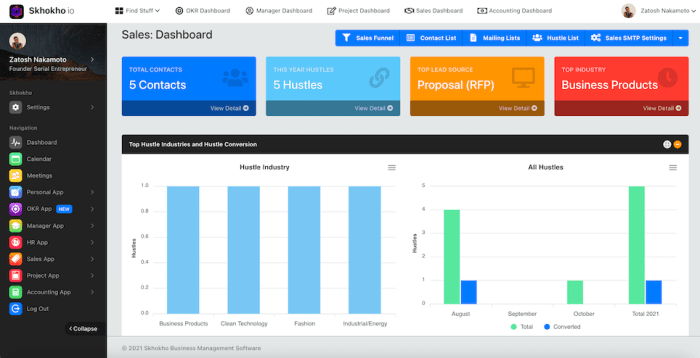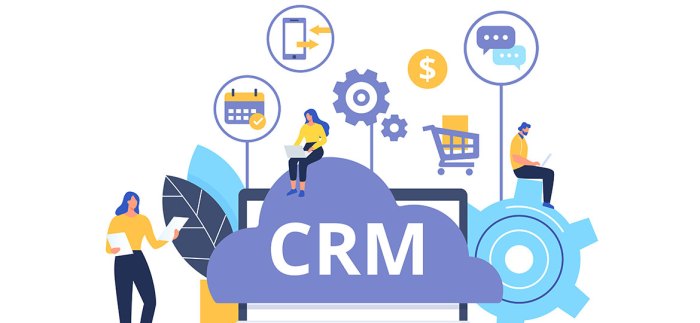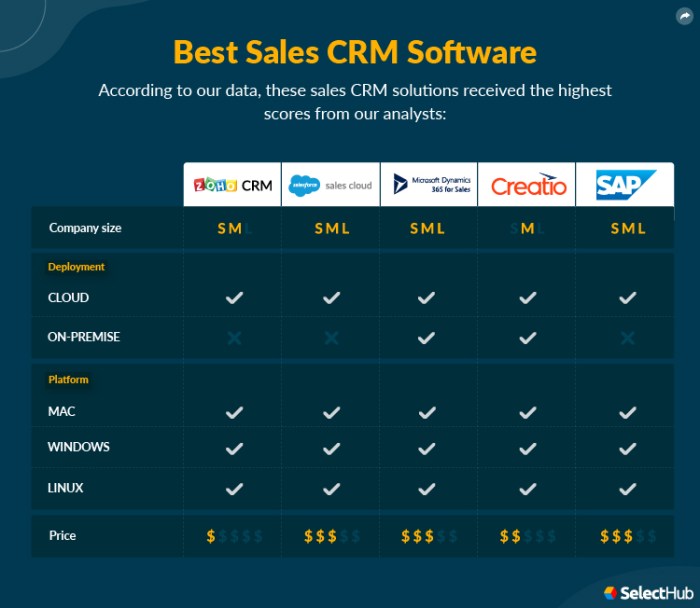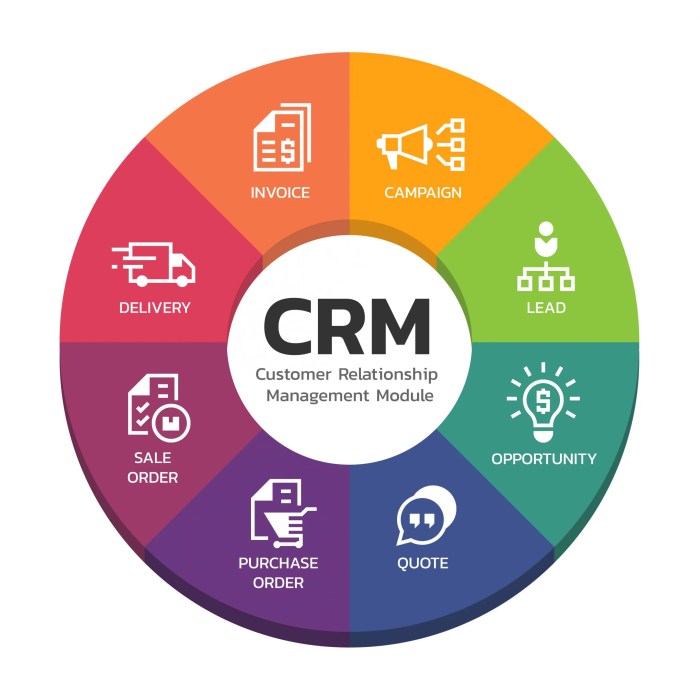CRM Software for Sales Teams Boosting Efficiency and Growth
CRM Software for Sales Teams is a game-changer for modern businesses, revolutionizing the way sales teams interact with customers and manage their operations. By centralizing customer data, automating tasks, and providing valuable insights, CRM software empowers sales teams to be more efficient, productive, and ultimately, more successful.
Imagine a world where your sales team has instant access to all customer information, automated follow-up systems, and data-driven insights to guide their strategies. This is the reality CRM software offers, enabling teams to focus on building stronger relationships, closing deals faster, and achieving their sales goals.
Introduction to CRM Software for Sales Teams

In today’s competitive business landscape, sales teams need every advantage they can get. CRM software, short for Customer Relationship Management, is a powerful tool that helps sales teams streamline their processes, improve customer relationships, and ultimately, drive more sales.CRM software acts as a central hub for all customer interactions, providing a comprehensive view of each customer’s journey. From initial contact to closing a deal and beyond, CRM systems capture and organize crucial data, allowing sales teams to personalize interactions, predict customer needs, and optimize their efforts.
Benefits of CRM Software for Sales Teams
CRM software offers numerous benefits for sales teams, significantly impacting their efficiency and success.
- Increased Productivity: CRM software automates repetitive tasks, freeing up valuable time for sales representatives to focus on higher-value activities like building relationships and closing deals. This includes automating tasks like email marketing, lead scoring, and appointment scheduling, leading to a significant increase in overall productivity.
- Improved Customer Relationships: By providing a complete picture of each customer, CRM software allows sales teams to personalize their interactions and deliver a more tailored experience. This leads to greater customer satisfaction, stronger relationships, and increased loyalty.
- Better Data Insights: CRM systems collect and analyze valuable data on customer behavior, sales performance, and marketing campaigns. This data provides insights into customer preferences, sales trends, and areas for improvement, enabling data-driven decision-making and optimized strategies.
Real-World Examples of CRM Software Success
Numerous companies have successfully leveraged CRM software to achieve significant sales growth and improve customer satisfaction.
- Salesforce: A leading CRM provider, Salesforce boasts a vast customer base, including companies like Coca-Cola, Adidas, and Ford. These companies have utilized Salesforce’s platform to manage their customer relationships, automate processes, and generate valuable insights, leading to improved sales performance and increased customer loyalty.
- HubSpot: HubSpot, another prominent CRM provider, has helped businesses like Netflix, Dropbox, and Zendesk streamline their sales processes, improve customer engagement, and achieve measurable results.
Key Features of CRM Software for Sales Teams
CRM software is designed to help sales teams manage their interactions with customers, from initial contact to closing deals. It provides a centralized platform for storing and accessing customer information, automating tasks, and analyzing sales performance.
Lead Management
A robust CRM system helps sales teams manage leads effectively, ensuring no potential customer slips through the cracks.
- Lead Capture: CRM software allows for lead capture from various sources, including websites, social media, and marketing campaigns. This ensures that all potential customers are captured and tracked.
- Lead Qualification: CRM systems help prioritize leads based on their potential value. This allows sales teams to focus on the most promising leads and optimize their time.
- Lead Nurturing: CRM systems enable personalized communication and automated follow-ups to nurture leads and move them through the sales funnel. This helps build relationships and increase the likelihood of conversion.
Opportunity Tracking
Opportunity tracking is a critical component of CRM software, enabling sales teams to manage and monitor their sales pipeline effectively.
- Pipeline Visibility: CRM systems provide a clear view of the sales pipeline, allowing sales managers to track the progress of deals and identify potential bottlenecks.
- Deal Stage Management: CRM software allows sales teams to move deals through different stages of the sales cycle, providing a structured approach to managing opportunities.
- Forecasting and Reporting: CRM systems generate reports and forecasts based on opportunity data, providing valuable insights into sales performance and future projections.
Sales Forecasting
Sales forecasting is a crucial aspect of CRM software, enabling sales teams to predict future sales performance and make informed business decisions.
- Historical Data Analysis: CRM systems utilize historical sales data to generate accurate forecasts. This data can include past sales performance, customer demographics, and market trends.
- Predictive Analytics: Advanced CRM systems incorporate predictive analytics to improve forecasting accuracy. These algorithms analyze various factors, including lead behavior and market conditions, to generate more precise forecasts.
- Scenario Planning: CRM software enables sales teams to create different sales scenarios and assess their potential impact on revenue. This allows for better planning and decision-making.
Customer Segmentation
Customer segmentation is a key feature of CRM software, enabling sales teams to target specific customer groups with tailored marketing and sales strategies.
- Demographic Segmentation: CRM systems allow for segmentation based on demographic factors, such as age, gender, location, and income.
- Behavioral Segmentation: CRM software enables segmentation based on customer behavior, such as purchase history, website activity, and engagement levels.
- Value Segmentation: CRM systems allow for segmentation based on customer value, identifying high-value customers and tailoring strategies to retain them.
Choosing the Right CRM Software for Your Sales Team: CRM Software For Sales Teams

Finding the perfect CRM software for your sales team is crucial for success. It’s an investment that can streamline processes, boost productivity, and ultimately, drive more revenue. However, with so many options available, choosing the right one can feel overwhelming.
This section will guide you through the process of selecting the ideal CRM solution by exploring key factors to consider, essential features to look for, and strategies for evaluating and comparing different solutions.
Factors to Consider When Choosing CRM Software
Several factors influence the selection of the right CRM software for your sales team. Understanding these factors will help you narrow down your choices and identify the most suitable option for your specific needs.
- Budget: Determine your budget for CRM software. Consider the cost of the software itself, as well as implementation costs, training, and ongoing support.
- Team Size: The size of your sales team will impact the features and functionalities you need. A small team might be satisfied with a basic CRM, while a large team may require a more robust solution with advanced features.
- Industry: Different industries have unique CRM needs. For example, a software company may require a CRM with strong lead management features, while a retail company may need a CRM with robust inventory management capabilities.
- Specific Business Needs: Consider your specific business needs and goals. What are your sales team’s pain points? What challenges do you need to address? The CRM software you choose should align with your business objectives.
Essential CRM Features for Different Sales Team Requirements
CRM software offers a wide range of features. It’s essential to prioritize features that align with your sales team’s requirements and business objectives.
- Lead Management: This feature helps sales teams track and manage potential customers. It includes features like lead capture, lead scoring, and lead nurturing. This is crucial for companies that rely on generating leads through various channels.
- Sales Pipeline Management: This feature provides a visual representation of the sales process, allowing teams to track the progress of deals. This helps to improve sales forecasting and identify potential bottlenecks. A robust pipeline management system helps to streamline the sales process and ensure deals move forward efficiently.
- Contact Management: This feature allows sales teams to store and manage customer information, including contact details, communication history, and purchase history. A strong contact management system ensures that sales teams have access to all the information they need to effectively interact with customers.
- Reporting and Analytics: This feature provides valuable insights into sales performance, allowing teams to track key metrics, identify trends, and make data-driven decisions. A comprehensive reporting and analytics system helps to measure sales effectiveness and optimize sales strategies.
- Integration: The ability to integrate with other business applications, such as email marketing platforms, accounting software, and marketing automation tools, is essential for seamless data flow and improved efficiency.
- Mobile Accessibility: Sales teams need to be able to access CRM data from anywhere, anytime. Mobile accessibility ensures that sales reps can stay connected with customers and manage their sales activities on the go.
Evaluating and Comparing CRM Solutions
Once you have identified the key factors and essential features, it’s time to evaluate and compare different CRM solutions.
- Request Demonstrations: Request demos from several CRM vendors to see the software in action and ask questions. This will give you a better understanding of the user interface, features, and functionality.
- Read Reviews and Testimonials: Check online reviews and testimonials from other users to get insights into the pros and cons of different CRM solutions. This can provide valuable information about the software’s performance, reliability, and customer support.
- Compare Pricing and Plans: Consider the pricing models and plans offered by different vendors. Make sure the chosen solution fits within your budget and provides the features you need.
- Assess Customer Support: Good customer support is crucial for any CRM software. Evaluate the level of support offered by different vendors, including response times, availability, and resources.
Implementing and Using CRM Software Effectively
Implementing CRM software is not just about installing the software; it’s about integrating it into your sales team’s workflow and culture. Effective implementation ensures that your team can fully leverage the benefits of CRM, maximizing its potential to boost sales and improve customer relationships.
Data Migration
The first step in implementing CRM software is migrating existing customer data. This process involves transferring information from your current systems, such as spreadsheets or legacy databases, to the CRM platform. This step is crucial to ensure that your sales team has a comprehensive view of your customer base right from the start.
- Clean and Validate Data: Before migrating data, it’s essential to clean and validate it to ensure accuracy and consistency. This involves removing duplicate entries, correcting errors, and standardizing data formats.
- Choose the Right Migration Method: Different CRM platforms offer various migration methods, such as manual data entry, data import tools, or integration with existing systems. Select the method that best suits your data volume and complexity.
- Test and Verify Data: After migration, thoroughly test and verify the data in the CRM system to ensure its accuracy and completeness. This step helps prevent errors and ensures that your sales team has access to reliable information.
User Training
Once the data is migrated, it’s essential to train your sales team on how to use the CRM software effectively. Proper training empowers them to leverage the software’s features to improve their sales processes and customer interactions.
- Develop a Comprehensive Training Program: Create a training program that covers all aspects of the CRM software, including basic navigation, core functionalities, and advanced features.
- Provide Hands-on Training: Hands-on training allows users to practice using the software in real-time, reinforcing their understanding of its features and functionality.
- Offer Ongoing Support: Provide ongoing support to users after initial training, addressing their questions and providing guidance as they become familiar with the software.
Process Integration
Integrating CRM software with your existing business processes is crucial for streamlining workflows and improving efficiency. This involves mapping CRM functionalities to existing sales processes and making necessary adjustments to ensure seamless integration.
- Identify Key Processes: Start by identifying the key sales processes that need to be integrated with the CRM system, such as lead generation, qualification, opportunity management, and customer service.
- Map CRM Features to Processes: Map the CRM software’s features to each sales process, ensuring that the software supports all necessary steps and workflows.
- Automate Tasks: Leverage the CRM software’s automation capabilities to streamline repetitive tasks, such as sending email campaigns, scheduling follow-up appointments, and generating reports.
Integration with Other Systems
CRM software can be integrated with other business systems and applications, such as email marketing platforms, accounting software, and social media tools, to create a unified and streamlined workflow.
- Identify Integration Needs: Start by identifying the other systems that need to be integrated with the CRM software, considering your specific business requirements and workflows.
- Choose Integration Methods: Explore different integration methods, such as API integrations, data synchronization tools, or third-party applications, to find the best solution for your needs.
- Test and Monitor Integrations: Thoroughly test the integrations after implementation to ensure seamless data flow and functionality. Continuously monitor the integrations to identify and resolve any issues.
CRM Software for Sales Team Automation
CRM software is designed to help sales teams manage their customer relationships more effectively, and automation is one of the key ways it does this. By automating repetitive tasks, CRM software frees up sales reps to focus on more strategic activities, such as building relationships and closing deals.
Lead Qualification Automation
Automating lead qualification can significantly improve the efficiency of your sales team. This involves using CRM software to automatically score leads based on specific criteria, such as industry, company size, or website activity. Leads are then automatically categorized as “hot,” “warm,” or “cold” based on their scores. This allows sales reps to prioritize their time by focusing on the most promising leads first.
- Lead Scoring: Many CRM systems have built-in lead scoring features that allow you to assign points to leads based on various criteria. For example, you can assign more points to leads who visit specific pages on your website, download white papers, or request a demo. This allows you to automatically prioritize leads based on their level of engagement.
- Lead Nurturing: CRM software can automate the process of nurturing leads. This involves sending personalized emails, content, and offers to leads based on their interests and behavior. This helps to keep leads engaged and move them further down the sales funnel.
- Lead Routing: Some CRM solutions can automatically route leads to the appropriate sales representative based on factors like location, industry, or product interest. This ensures that leads are handled by the right person, increasing the chances of conversion.
Follow-Up Scheduling Automation
CRM software can automate follow-up scheduling, ensuring that sales reps stay in touch with leads and prospects at the right time. This can involve setting reminders for follow-up calls, emails, or other activities.
- Automated Email Sequences: CRM systems can automatically send personalized email sequences to leads based on their behavior. For example, you can set up an email sequence to be sent to leads who have downloaded a white paper or visited your website. This helps to keep leads engaged and move them further down the sales funnel.
- Meeting Scheduling: CRM software can automatically schedule meetings with leads and prospects. This can be done through integrations with calendar apps like Google Calendar or Outlook.
- Task Reminders: CRM systems can set reminders for tasks that need to be completed, such as sending a follow-up email or making a phone call. This helps to ensure that sales reps are always on top of their tasks and deadlines.
Email Marketing Automation
CRM software can automate email marketing campaigns, allowing sales teams to send personalized messages to leads and customers at scale. This can involve sending newsletters, promotions, and other types of email content.
- Targeted Email Campaigns: CRM systems allow you to segment your email lists based on factors like demographics, interests, and buying behavior. This allows you to send targeted email campaigns that are more likely to resonate with your audience.
- Automated Email Triggers: CRM software can trigger emails based on specific events, such as a lead downloading a white paper or a customer making a purchase. This allows you to send timely and relevant emails that can help to nurture leads and increase sales.
- Email Analytics: CRM systems provide insights into email performance, allowing you to track open rates, click-through rates, and other metrics. This helps you to optimize your email campaigns for better results.
CRM Software Automation Features Comparison, CRM Software for Sales Teams
| Feature | Salesforce | HubSpot | Zoho CRM | Microsoft Dynamics 365 ||—|—|—|—|—|| Lead Scoring | Yes | Yes | Yes | Yes || Lead Nurturing | Yes | Yes | Yes | Yes || Lead Routing | Yes | Yes | Yes | Yes || Automated Email Sequences | Yes | Yes | Yes | Yes || Meeting Scheduling | Yes | Yes | Yes | Yes || Task Reminders | Yes | Yes | Yes | Yes || Targeted Email Campaigns | Yes | Yes | Yes | Yes || Automated Email Triggers | Yes | Yes | Yes | Yes || Email Analytics | Yes | Yes | Yes | Yes |
CRM Software and Sales Analytics

CRM software goes beyond just managing customer interactions. It’s a powerful tool for gathering and analyzing sales data, offering valuable insights into customer behavior, sales performance, and campaign effectiveness. This data-driven approach empowers sales teams to make informed decisions, optimize strategies, and ultimately, drive better results.
Sales Data Tracking and Analysis
CRM software acts as a central repository for all your sales data, capturing information about leads, opportunities, deals, customer interactions, and more. This data can be analyzed to uncover valuable patterns and trends, providing a comprehensive understanding of your sales performance. Here are some key aspects of sales data tracking and analysis using CRM software:
- Customer Behavior Analysis: CRM software helps you track customer interactions, understand their buying patterns, and identify their preferences. By analyzing customer data, you can segment your audience based on demographics, interests, and purchase history, allowing for targeted marketing campaigns and personalized sales approaches.
- Sales Performance Monitoring: CRM software provides real-time insights into sales performance metrics such as conversion rates, average deal size, sales cycle length, and win rates. This data helps you identify areas of strength and weakness, enabling you to optimize sales processes and improve overall performance.
- Campaign Effectiveness Evaluation: CRM software tracks the performance of your marketing campaigns, allowing you to measure their impact on sales. By analyzing data such as leads generated, conversion rates, and return on investment (ROI), you can determine which campaigns are most effective and refine your marketing strategies accordingly.
Sales Analytics Dashboard
A sales analytics dashboard is a visual representation of key sales metrics that provides a quick and comprehensive overview of your sales performance. It’s a powerful tool for monitoring progress, identifying trends, and making data-driven decisions.Here are some essential metrics that should be included in a sales analytics dashboard:
- Pipeline Overview: This section displays the total value of your sales pipeline, broken down by stage, providing a clear picture of potential revenue opportunities.
- Conversion Rates: This metric tracks the percentage of leads that convert into customers at each stage of the sales funnel, highlighting areas for improvement.
- Average Deal Size: This metric tracks the average value of closed deals, providing insights into the profitability of your sales efforts.
- Sales Cycle Length: This metric measures the time it takes to close a deal, helping you identify bottlenecks and optimize your sales processes.
- Win Rate: This metric tracks the percentage of deals that are successfully closed, indicating the effectiveness of your sales team and strategies.
- Customer Acquisition Cost (CAC): This metric measures the cost of acquiring a new customer, providing insights into the efficiency of your marketing and sales efforts.
- Customer Lifetime Value (CLTV): This metric estimates the total revenue a customer will generate over their lifetime, helping you prioritize high-value customers and optimize customer retention strategies.
Data-Driven Sales Strategy Improvement
The insights derived from CRM software can be used to refine your sales strategies and make data-driven decisions. Here’s how:
- Identify Sales Bottlenecks: By analyzing sales cycle length and conversion rates, you can identify areas where deals are getting stuck or where sales processes are inefficient. This allows you to focus on streamlining these processes and improving efficiency.
- Optimize Sales Processes: Data from CRM software can help you understand which sales methods and strategies are most effective. You can then adjust your sales processes to incorporate these best practices and improve overall performance.
- Target the Right Customers: CRM software provides insights into customer behavior and preferences, allowing you to segment your audience and target your marketing and sales efforts more effectively. This leads to increased conversion rates and improved ROI.
- Personalize Sales Interactions: By leveraging customer data, you can personalize your sales interactions and provide a more tailored experience for each customer. This increases customer satisfaction and strengthens relationships.
- Predict Sales Outcomes: Advanced CRM software utilizes predictive analytics to forecast future sales performance, allowing you to proactively adjust your strategies and maximize revenue opportunities.
Future Trends in CRM Software for Sales Teams
The landscape of CRM software is constantly evolving, driven by technological advancements and the changing needs of sales teams. As businesses increasingly embrace digital transformation and seek to enhance their sales processes, CRM software is adapting to provide more sophisticated and integrated solutions. Here are some of the key trends shaping the future of CRM software for sales teams.
AI-Powered CRM Features
AI is transforming the way CRM software operates, automating tasks, providing insightful data analysis, and enhancing user experiences.
- Predictive Analytics: AI algorithms can analyze historical data and current trends to predict future sales outcomes, helping sales teams prioritize leads and allocate resources effectively. For example, a CRM system could use AI to identify high-potential leads based on their online activity, purchase history, and demographics.
- Personalized Customer Interactions: AI-powered chatbots and virtual assistants can provide personalized customer service and support, responding to inquiries, scheduling appointments, and resolving issues in real time. These intelligent systems can learn from customer interactions and provide tailored recommendations and solutions.
- Sales Process Optimization: AI can automate repetitive tasks such as data entry, lead qualification, and follow-up communications, freeing up sales reps to focus on more strategic activities. AI-driven insights can also help identify areas for improvement in sales processes and suggest actionable recommendations.
Implementing and effectively utilizing CRM software can transform your sales team into a well-oiled machine, driving growth and exceeding expectations. By leveraging the power of automation, data analytics, and customer-centric features, your sales team can achieve new heights of success, forging stronger customer relationships and propelling your business forward.
Top FAQs
What are the key differences between CRM software and customer service software?
While both focus on customer interactions, CRM software primarily focuses on sales processes, lead management, and opportunity tracking. Customer service software, on the other hand, prioritizes customer support, ticketing systems, and resolving customer issues.
Is CRM software suitable for small businesses?
Absolutely! Many CRM solutions are designed for small businesses with user-friendly interfaces and affordable pricing plans. They offer valuable tools to manage customer interactions and drive growth even for smaller teams.
How long does it typically take to see results from using CRM software?
The time it takes to see results varies depending on factors like the size of your team, the complexity of your implementation, and the level of adoption. However, most businesses start seeing positive impacts within a few months of implementing CRM software.
What are some of the common mistakes businesses make when implementing CRM software?
Common mistakes include not having clear goals, insufficient training for users, neglecting data quality, and failing to integrate the CRM with other business systems.

